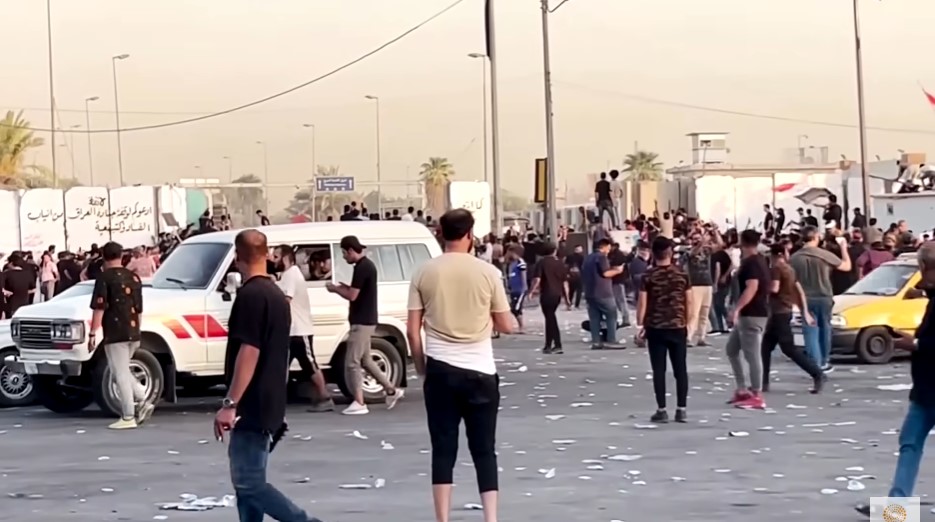No one who’s been following the news in Iraq since last year’s inconclusive parliamentary elections should be surprised to see violence currently erupting in Baghdad.
For months, various political factions have jostled unsuccessfully for a governing majority. Muqtada al Sadr, the volatile cleric who fueled much of the bloodshed in Iraq after the U.S. invasion, controls the most seats but not enough to form a governing coalition. This past weekend, he decided to turn up the heat.
On Saturday, al Sadr set a 72-hour time limit to resolve the crisis and insisted that all political actors leave the public stage to give way to a new generation. If this failed, he suggested violence would be the last recourse — including the forcible closure of Iraq’s oil fields. On Monday, he made good on the threat as the Green Zone erupted in fighting, and some of Sadr’s followers occupied oil facilities. While Sadr claims he is trying to restore order, he has clearly demonstrated the capability to create violent chaos in Baghdad, and what comes next is anyone’s guess.
While Americans have excellent reason to be wary of the endless political dysfunction and endemic corruption in Iraq, this threat brings into sharp relief the twin realities that demand attention: the potential for a dramatically heightened global energy crisis and the violent malign influence of the Islamic Republic of Iran.
Some three and a quarter million barrels of oil a day flow out of Iraq. Major political disruptions will carry over and cause significant supply disruptions just as the world continues to struggle with international restrictions on Russian oil.
In other words, Iraq’s turmoil could represent yet another severe shock to fragile global energy markets. This could easily lead to further spikes in U.S. energy prices unless the Biden administration takes immediate steps to insulate America from them.
Biden and his secretary of energy have been downright schizophrenic on this issue, ping-ponging between demonizing the Saudi crown prince and “Big Oil” on the one hand and pleading with the prince for increased supply and with the energy sector to stockpile refined products on the other.
To best protect the U.S. from a severe shock, the administration must immediately clarify ongoing confusion over future leasing and permits for domestic production of gas and oil.
The use of the country’s strategic petroleum reserves as a political plaything must stop, and the only useful item in the recent Inflation Reduction Act — the boost to domestic civil nuclear infrastructure — should be accelerated. Biden is inviting the burgeoning European energy crisis to our shores if Iraq goes offline absent these actions to maximize clean, efficient production of U.S. energy.
Next, due to the critical security issues related to Iran playing out in the region, Washington must look beyond Baghdad in its dealings with Iraq. In recent days, U.S. troops in Syria have been attacked by Iranian proxies operating out of Iraq — and retaliated from American-controlled locations in Iraq, such as Erbil in Kurdistan or Al-Asad airbase in Anbar province, both of which are critical to being able to carry out such operations.
However well-intentioned, the prioritization of a unified Iraq has led to Baghdad’s bullying of the rest of the country, like Kurdistan. Among all Iraqis, the Kurds have been the best and most consistent friends of the U.S. In the event of a broader meltdown in Iraq, preserving stability in Kurdistan may be the U.S.’s best bet for maintaining influence in the country. This influence will have the advantage of keeping Kurdistan’s daily 500,000 barrels of oil on the market.
The American footprint at Al-Asad is akin to the Bagram Airfield lost by Biden in Afghanistan. The base is a sprawling but secure facility with many uses ranging from surveillance to counter-terrorism operations. During President Obama’s withdrawal from Iraq in 2011, the base was handed over to the Iraqi government. It was subsequently overrun and controlled by ISIS until the U.S. military returned to Iraq to fight the terrorist group in 2014.
Rather than abandon it again, the Biden administration should learn from the lessons of Afghanistan and develop a plan to protect and maintain a position at Al-Asad. Given the increasing aggression from the Islamic Republic across the Middle East, it is likely that aggressions will only increase and further threaten our regional partners. We must retain key leverage.
Along these lines, the enormous and now unnecessary U.S. Embassy in Baghdad must be revisited. This ziggurat-like structure, which cost more than a billion dollars and became a symbol of U.S. overreach in Iraq, may well prove a sitting duck as militants and weapons swarm into the Green Zone. Rather than prioritizing maintaining the Embassy, as we did in Afghanistan, we should instead assess how to secure our diplomats and retain what representation is needed in Erbil and at Al-Asad in the event of a full government collapse in Baghdad.
With the first anniversary of the fall of Afghanistan occurring this past month, another milestone looms on the horizon: the 20th anniversary of the U.S. invasion of Iraq next March. Amazingly, the Biden administration has been attempting to spin the fall of Afghanistan as the best of all possible outcomes.
This delusion raises the alarm that Biden will try to repeat his disastrous Afghanistan playbook in Iraq. Such failure is not preordained if we can learn from the mistakes of Afghanistan and not repeat them in Iraq.









